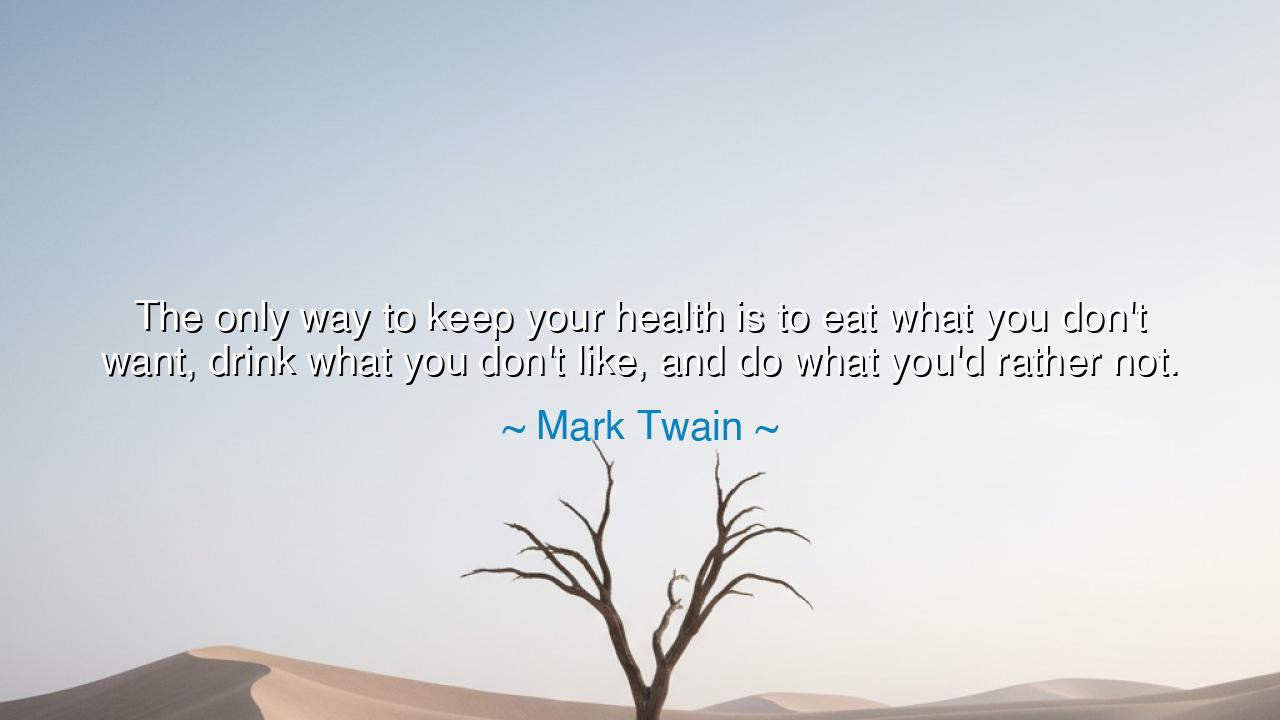
The only way to keep your health is to eat what you don't want
The only way to keep your health is to eat what you don't want, drink what you don't like, and do what you'd rather not.






The words of Mark Twain, “The only way to keep your health is to eat what you don't want, drink what you don't like, and do what you'd rather not,” are wrapped in humor, but beneath that laughter lies a profound understanding of human weakness and discipline. Twain, the great observer of mankind, knew that wisdom often hides behind irony, and in this quote, he exposes one of life’s simplest but hardest truths: that health requires sacrifice, and that what preserves us is rarely what pleases us. It is a paradox of the flesh and the will—what we desire brings pleasure to the moment but decay to the body; what we resist often brings the strength to endure.
Twain’s humor was never idle. Beneath his wit lived a philosopher who saw into the contradictions of human nature. The origin of this quote comes from his reflections on the indulgent habits of his age—an era of lavish meals, whiskey, cigars, and late nights of storytelling and excess. He saw how people professed to value health, yet chased every temptation that destroyed it. In his wry way, he tells us that health, like virtue, must be earned through restraint. To eat what you don’t want and to drink what you don’t like are metaphors for doing what is necessary, not merely what is pleasant. The road to wellness, as to wisdom, passes through self-mastery.
There is ancient resonance in Twain’s jest. The Stoic philosophers of old—Seneca, Epictetus, and Marcus Aurelius—taught the same truth without the smile. They spoke of the discipline of the body as the first step toward the discipline of the soul. To deny oneself, they said, is to learn freedom, for the one who cannot master his appetites is a slave even in luxury. Twain, though not a Stoic, stood beside them in spirit: his humor is the laughter of a sage who has seen too many people destroy themselves through pleasure and call it living. He knew that the sweetness of indulgence is fleeting, but the bitterness of regret endures.
Consider the life of William Banting, the English undertaker of the 19th century, who nearly ate himself to death. Wealthy and idle, he indulged in every delight of the table until his body rebelled—he grew so heavy that he could no longer climb stairs or tie his shoes. In desperation, he turned to science and discipline. He ate less, drank water instead of ale, and walked daily though he hated it. Slowly, his strength returned. He later wrote a book titled Letter on Corpulence, which became one of the earliest guides to healthy living. His transformation stands as living proof of Twain’s words: health demands the courage to choose what is hard over what is easy.
Twain’s quote also speaks to a broader moral truth. Health, in his eyes, is not merely of the body but of the spirit. The same rule that governs the flesh governs the heart and mind. To grow wise, we must read what challenges us, not what flatters us. To grow strong, we must face what frightens us, not what comforts us. Every act of self-restraint, though painful in the moment, is an investment in freedom. And every indulgence that dulls the will is a quiet surrender to decay. The discipline of health is thus a metaphor for the discipline of life itself.
Yet, Twain does not preach despair—he laughs, because he understands. He knew that humans are creatures of appetite, forever torn between desire and duty. His humor softens the hard lesson: that the path to strength is rarely lined with pleasure. But by laughing at the difficulty, he teaches us to bear it. He invites us to embrace discipline not with grimness, but with courage and irony—to see that the very acts we resist most fiercely are the ones that build our vitality and wisdom.
The lesson is timeless: cherish the things that sustain you, even when they are not easy or sweet. Rise early when you wish to sleep. Walk when you wish to rest. Drink water when you crave wine. The body, like the soul, thrives on balance and boundaries. Pleasure will always tempt you toward ease, but discipline leads you to endurance, and endurance is the true companion of joy. For when the body is strong and the spirit unclouded, even the simplest meal tastes divine.
So let these words of Twain be carried as a kind of cheerful commandment: to keep one’s health is to honor life through restraint. The road may be narrow, and the choices may chafe against desire, but beyond that struggle lies freedom—the freedom of vitality, clarity, and peace. And when you live long and well because of what you once resisted, you will understand the wisdom in his jest: that the bitter discipline of today becomes the sweet laughter of tomorrow.






AAdministratorAdministrator
Welcome, honored guests. Please leave a comment, we will respond soon